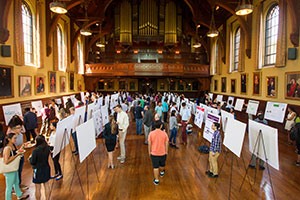PROVIDENCE, R.I. [Brown University] — Ever since she attended a weeklong camp at the Centers for Disease Control and Prevention in high school, Brown rising senior Nari Lee has spent at least a portion of her summers engaged with science. And with each successive year, she has advanced — from becoming inspired, to becoming technically skilled, to becoming an intellectual contributor in lab work.
This summer, with the support of an UTRA, Lee worked in the lab of Amanda Jamieson, assistant professor of molecular microbiology and immunology, performing research on the toxicity of e-cigarettes. Over the two summers prior, she worked in her hometown of Atlanta at Emory University and Georgia Tech.
“There’s definitely a progression,” she said. “The first year I did research I didn’t know what I was doing, honestly. It was more like learning how to do science — basic pipetting and sterilization techniques. I wasn’t able to understand what I was doing and why. The second year I became closer to the grad students and was more invested in my research.”
This summer, Lee used her strong foundation of technical skills to think more comprehensively about why she was doing the research and how best to go about it. “I still needed help from the postdoc who was mentoring me, but I feel like the balance of planning and workload was a lot more equal than in past years,” she said.
Alongside postdoctoral researcher Meredith Crane, Lee conducted experiments showing that the chemicals found in e-cigarettes can kill immune system cells even at concentrations of two percent or less. Working with materials sourced from local stores, Lee exposed mouse macrophage cells both to concentrations of the vapor produced by e-cigarettes and to the liquid that is vaporized. Low concentrations could kill, she found, but the higher the concentration, the more lethal the chemicals were.
Lee joined Jamieson’s lab in the spring and will continue to work there through graduation as she pursues a senior thesis. That will include testing hypotheses about the potential effects of e-cigarette vapor exposure on inflammatory responses and immune system performance in the lungs in mice. She’ll continue to work with Crane to develop and perform the experiments to examine those hypotheses.
Lee said that a solid research background will help her fulfill her goal of going to medical school. It also makes intuitive sense to her that doctors should understand research.
“I don’t want to go into medicine without knowing how science works,” she said.
What attracted Lee to Jamieson’s lab was the direct relevance of her research to public health (she tells friends about her results with a warning not to start “vaping.”). Lee’s interest in biology has always been about disease. She traces that inspiration not only to the CDC camp, recommended by her AP biology teacher, but also to reading the 1995 book “The Hot Zone,” about the emergence of Ebola.
For all her interest in disease-oriented research, Lee elected to come to Brown because she felt it had a friendly academic climate, including the Open Curriculum. Here a pre-med career track wouldn’t seem so stressful or preclude her other interests. Last fall, for example, she spent the semester abroad in Lyon, France, studying French and prepping for the MCAT. This fall she plans to take Spanish, even as she continues to work in Jamieson’s lab.
But along the way, thanks in part to her UTRA, Lee will have continued to progress as a physician-scientist, one summer at a time.
